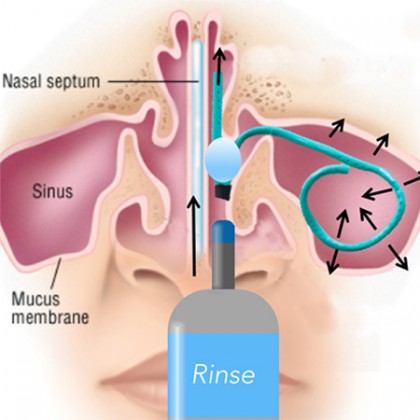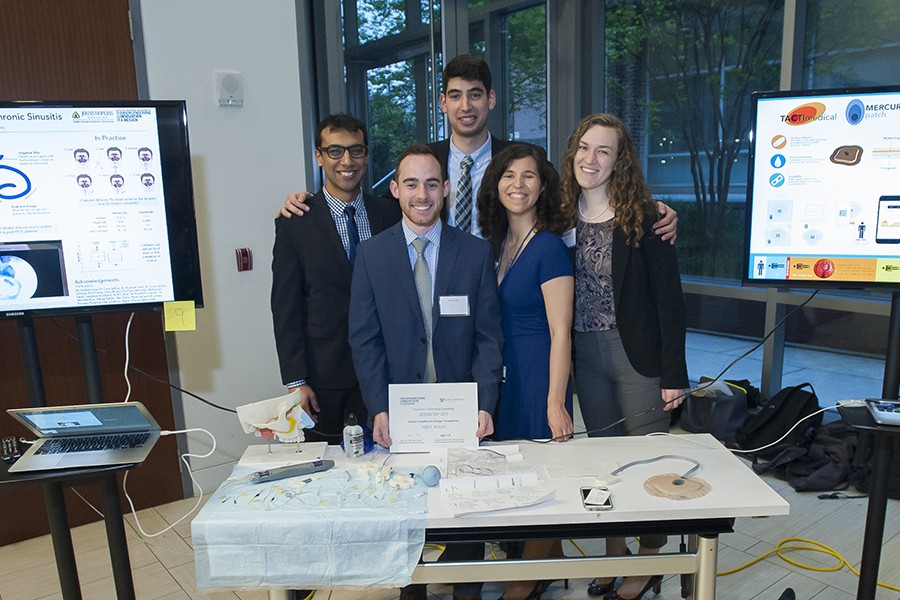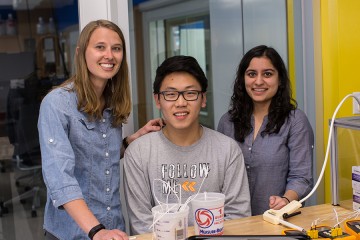A device to treat persistent and reoccurring sinus infections took the top award in the first-ever Student Healthcare Design Competition, which was held on Johns Hopkins University's East Baltimore campus on Tuesday and sponsored by the Johns Hopkins Center for Bioengineering Innovation and Design.

Image caption: Diagram depicts the Salient ENT device implant in the nasal cavity and the flow of therapeutic fluids to the sinuses
Unlike other business plan competitions at Johns Hopkins, the Student Healthcare Design Competition focused on the design and development of effective solutions to major healthcare problems. Forty-nine student teams from across the university submitted proposals, and 13 finalists competed in the event for $20,000 in prize money.
Salient ENT took home the $4,000 top prize for its sinus infection solution.
"We're thrilled to have received first place," says Elizabeth Lebling, one of the inventors of Salient ENT, who will graduate with her master's degree in May. "We're starting conversations now with outside individuals who have experience translating these types of devices to the marketplace to help real patients."
Approximately one in eight Americans suffer from persistent nasal sinus inflammation, Lebling says, and patients incur roughly $8.6 billion in annual surgical costs without adequate relief.
Under the clinical direction of Andrew Lane, director of the Johns Hopkins Sinus Center, Salient ENT developed the "Hana Catheter" that is placed in a patient's sinuses in a simple outpatient procedure. It can stay in place for up to 30 days, allowing the patient to connect an external rinse bottle to the catheter in order to deliver therapeutic fluids directly to inflamed tissue.
A 2012 CBID team, under the direction of Lane, developed the broad concept, says CBID graduate student Scott Stanley, who plans to stay with Salient ENT through the startup phase.
"We've advanced that concept and developed it into a functioning prototype," he said. "It's been through bench-top and cadaveric testing, and our next step is working with a manufacturer to have it made to spec for animal and human testing."
In addition to Lebling and Stanley, the team included CBID master's students Amal Afroz Alam, Emily Eggert, and Demetri Monovoukas.
Second place in the competition went to Mercury Patch, a low-cost monitoring system for pressure sores; and third place went to CricSpike, a handheld device for emergency procedures on the battlefield to open a soldier's blocked airway.
Other teams that received honorable mentions included: Organ Donation, a smartphone App to increase live organ donation; and Kubanda, a new breast cancer treatment device for low-resource settings.
A team called Grup, which offered a mobile platform aimed at providing peer support and group therapy for those with depression and anxiety, received the CBID-Technology Innovation Center's Digital Health Award.
CBID operates within the Johns Hopkins Department of Biomedical Engineering, which is shared by the university's School of Medicine and its Whiting School of Engineering. The Student Healthcare Design Competition took place during the Department of Biomedical Engineering's annual Design Day, which features presentations, posters, and prototypes of dozens of medical innovations developed over the year by student-clinician teams. This year's Design Day was attended by more than 300 researchers, clinicians, industry sponsors, and students and featured a keynote address by SynapDx CEO Stan Lapidus, a serial entrepreneur and inventor who founded and led Cytyc, EXACT Sciences, and Helicos BioSciences, enterprises inspired in part by the work of Johns Hopkins Medicine's Bert Vogelstein, the Clayton Professor of Oncology and Pathology.
"Stan's candid account of his experience was an inspiration," says Youseph Yazdi, CBID's executive director. "His innovations have saved millions of lives around the world, including here at Johns Hopkins. Today he gave a clear picture of the ups and downs, pivots and perseverance necessary to be successful in healthcare innovation. I have no doubt there are several future Stans in that Design Day audience. "
Posted in Health, Science+Technology
Tagged biomedical engineering, cbid









